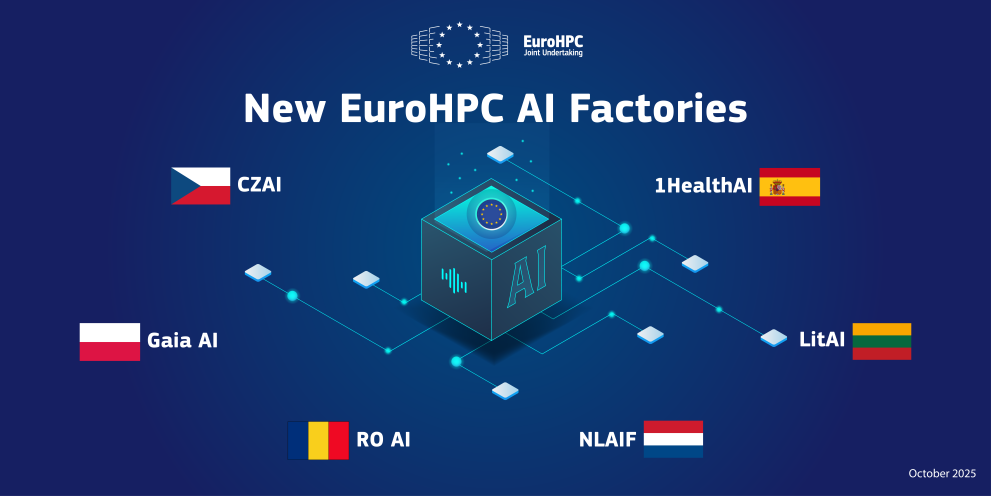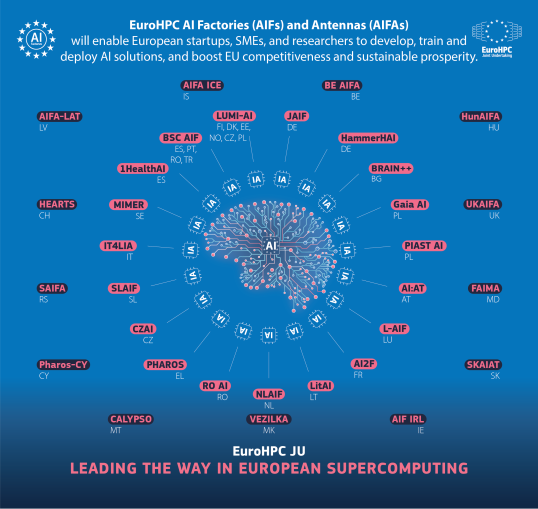
The newly selected AI Factories will join the 13 previously chosen sites, forming an interconnected network of AI hubs ready to drive innovation across Europe.
Czechia, Lithuania, Netherlands, Poland, Romania and Spain will deploy new AI-optimised systems with AI Factories to further expand Europe’s AI infrastructure. The AI Factory in Spain will also include an experimental platform, which will serve as a cutting-edge infrastructure for developing and testing innovative AI models and applications, as well as promoting collaboration across Europe.
Each AI factory will act as a one-stop shop nationally, offering European AI startups, SMEs, and researchers comprehensive support to develop their AI-ready data and gain access to AI-optimised HPC resources, training, and technical expertise.
This expansion strengthens Europe’s position as a global leader in artificial intelligence and ensures that AI solutions can be developed, tested, and scaled within a digitally sovereign European ecosystem.
CZECHIA (CZAI)
The Czech AI Factory (CZAI) will support the development and adoption of AI in Czechia. It will be linked to KarolAIna, a new supercomputer optimised for AI workloads and building on the EuroHPC petascale system Karolina, hosted and operated by IT4Innovations National Supercomputing Center. The Czech AI Factory will focus on practical applications, technological infrastructure, and skills development, enabling deeper integration of the Czech AI ecosystem into the European network of AI Factories and other AI initiatives within AI Continent.
The consortium is led by VSB—Technical University of Ostrava, in collaboration with Brno University of Technology, Charles University, the Czech Technical University in Prague International Neurodegenerative Disorders Research Center, and the Institute of Organic Chemistry and Biochemistry. CZAI is designed to serve all Czech and European AI industrial, academic, and public institutions.
LITHUANIA (LitAI Factory)
LitAI Factory aims to transform Lithuania’s HPC capabilities into a sovereign AI optimised infrastructure that can meet the needs of national and European ambitions. The project will be led by the Vilnius University and hosted at the upgrade-ready LRTC VDC3 data center facility in Vilnius to deliver a high-quality platform. The consortium includes Vilnius University (VU), Kaunas University of Technology (KTU), Vilnius Gediminas Technical University (VILNIUS TECH), Vytautas Magnus University (VMU), State Data Agency (SDA), SC Lithuanian Radio and Television Centre (LRTC), Innovation Agency (IA), and other affiliated partners.
The LitAI Factory will provide a full spectrum of services from HPC for AI workloads and data storage to accelerator access and innovation support, while prioritising key sectors such as cybersecurity, green energy, smart industry, and digital health. By strengthening synergies with the Polish HPC and quantum sites and engaging in broader collaborations with EU initiatives, LitAI Factory aims to position Lithuania as an active contributor to the European AI ecosystem.
NETHERLANDS (NLAIF)
The NLAIF will be a nationally hosted, Europe oriented project that aims to bridge the gap between AI research breakthroughs and their rapid, large-scale application in the Netherlands and Europe. The Dutch AI Factory consortium would host and operate a newly acquired AI-optimised supercomputer. The AIFNL Foundation will be the lead partner and hosting entity together with a consortium comprising SURF, Samenwerking Noord, TNO and AIC4NL.
NLAIF will offer customised AI compute capacity on secure, scalable, EU- regulations compliant infrastructure, with storage capacity, high-speed connectivity, support for sensitive data, skills development, and a commitment to open technology sovereignty. This AI Factory will put special emphasis on AI applications involving highly sensitive data such as health information or IP-protected datasets and focus on the application of AI in sectors such as healthcare, safety, and agriculture.
POLAND (Gaia AI Factory)
The Gaia AI Factory project aims to accelerate the development and increase the adoption of cutting-edge AI technologies in Poland. The project includes the expansion of robust infrastructure, enhanced access to big data repositories, and the strengthening of skills and competencies through a broad range of training and advisory services, as well as a programme for talent development. The target sectors include healthcare, the space and LLMs.
The project targets entrepreneurs, students, researchers, and representatives of public administration at various levels of AI advancement by providing comprehensive support throughout the entire AI lifecycle.
The Factory will be deployed and operated by Cyfronet AGH within the framework of the PLGrid infrastructure. The consortium partners cover the entire geographical area of Poland. The Gaia AI Factory will collaborate with PIAST and LUMI AI Factories to create an integrated AI ecosystem in Central Europe.
ROMANIA (RO AI Factory)
The RO AI Factory aims to transform SMEs from passive technology adopters into active AI innovators by prioritising services, training, and infrastructural access.
The RO AI Factory will be hosted and co-coordinated in Bucharest by the National Institute for Research & Development in Informatics – ICI Bucharest with University Politehnica of Bucharest (UPB) and includes as consortium partners the Technical University of Cluj-Napoca (UTCN), the National Institute of Research and Development for Biological Sciences (INCDSB), the Transilvania IT Association (ATIT), the Research Institute for Artificial Intelligence (ICIA), the National Council of Small and Medium Sized Private Enterprises in Romania (CNIPMMR), and the Association of Romanian Digital Innovation Hubs (RoDIH).
The Factory aims to acquire and deploy an AI-optimised supercomputer, provide a comprehensive suite of AI-enabling services, including HPC access, AI model development and training support, data space hosting, algorithm libraries, and tools for responsible and trustworthy AI. This integrated service model will ensure that a broad spectrum of Romanian and European stakeholders can engage with, contribute to, and benefit from the RO AI Factory.
SPAIN (1HealthAI)
The Spanish 1HealthAI (One-Health AI Factory) aims to position Europe as a global leader in One-Health products, services, and research. It will develop trustworthy AI tailored to human, animal, and environmental health, featuring an experimental platform for testing AI models.
Hosted at the Galicia Supercomputing Center (CESGA)—a CSIC and Xunta de Galicia institution—the factory is supported by Spain's Ministry of Science, Innovation and Universities through the Spanish Supercomputing Network (RES), and the Xunta de Galicia.
Key partners include Galicia’s three public universities and their One Health and AI excellence centers (CIGUS Network), the European Digital Innovation Hub DATAlife, and Gradiant technology center. The initiative spans climate–health interactions, genomics, personalised medicine, sustainable agri-food systems, blue biotechnology, pharmaceutical innovation, and environmental health. 1HealthAI will also collaborate with other AI Factories such as BSC AI Factory, IT4LIA, HammerHAI, and national supercomputing centres across Europe.
More Details
As a result of the third cut-off on 30 June 2025, under the EUROHPC-2024-CEI-AI-02 call, the EuroHPC JU Governing Board has approved the selection of six new AI Factories. So far, 19 sites across Europe have been selected to host AI Factories.
In December 2024, seven countries were selected to host Europe’s initial AI Factories in Finland, Germany, Greece, Italy, Luxembourg, Spain and Sweden. In March 2025, the EuroHPC JU selected six additional AI Factories in Austria, Bulgaria, France, Germany, Poland, and Slovenia.
Background
The EuroHPC JU is a legal and funding entity that brings together the European Union and participating countries to coordinate efforts and pool resources with the objective of making Europe a world leader in supercomputing.
To equip Europe with a cutting-edge supercomputing infrastructure, the EuroHPC JU has already procured 11 supercomputers, distributed across Europe. Three of these EuroHPC supercomputers are now ranked among the world’s top 10 most powerful supercomputers: JUPITER in Germany, Europe’s first exascale supercomputer (4th place) along with LUMI in Finland (9th place), Leonardo in Italy (10th place).
European scientists and users from the public sector and industry can benefit from EuroHPC supercomputers via the EuroHPC Access Calls no matter where in Europe they are located, to advance science and support the development of a wide range of applications with industrial, scientific and societal relevance for Europe.
The EuroHPC JU is also deploying a European Quantum Computing infrastructure, integrating diverse European quantum computing technologies with existing supercomputers. EuroHPC JU already inaugurated PIAST-Q in Poznań, Poland and VLQ in Ostrava, Czechia, marking a milestone in Europe’s leap into the quantum era.
The EuroHPC JU also funds research and innovation projects to develop a full European supercomputing supply chain, from processors and software to applications to be run on these supercomputers and know-how to develop strong European HPC expertise.
Details
- Publication date
- 10 October 2025
- Author
- European High-Performance Computing Joint Undertaking
